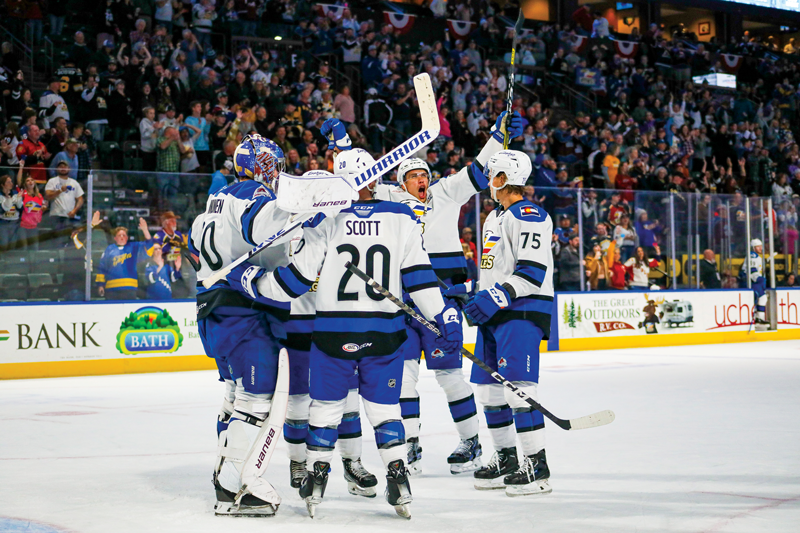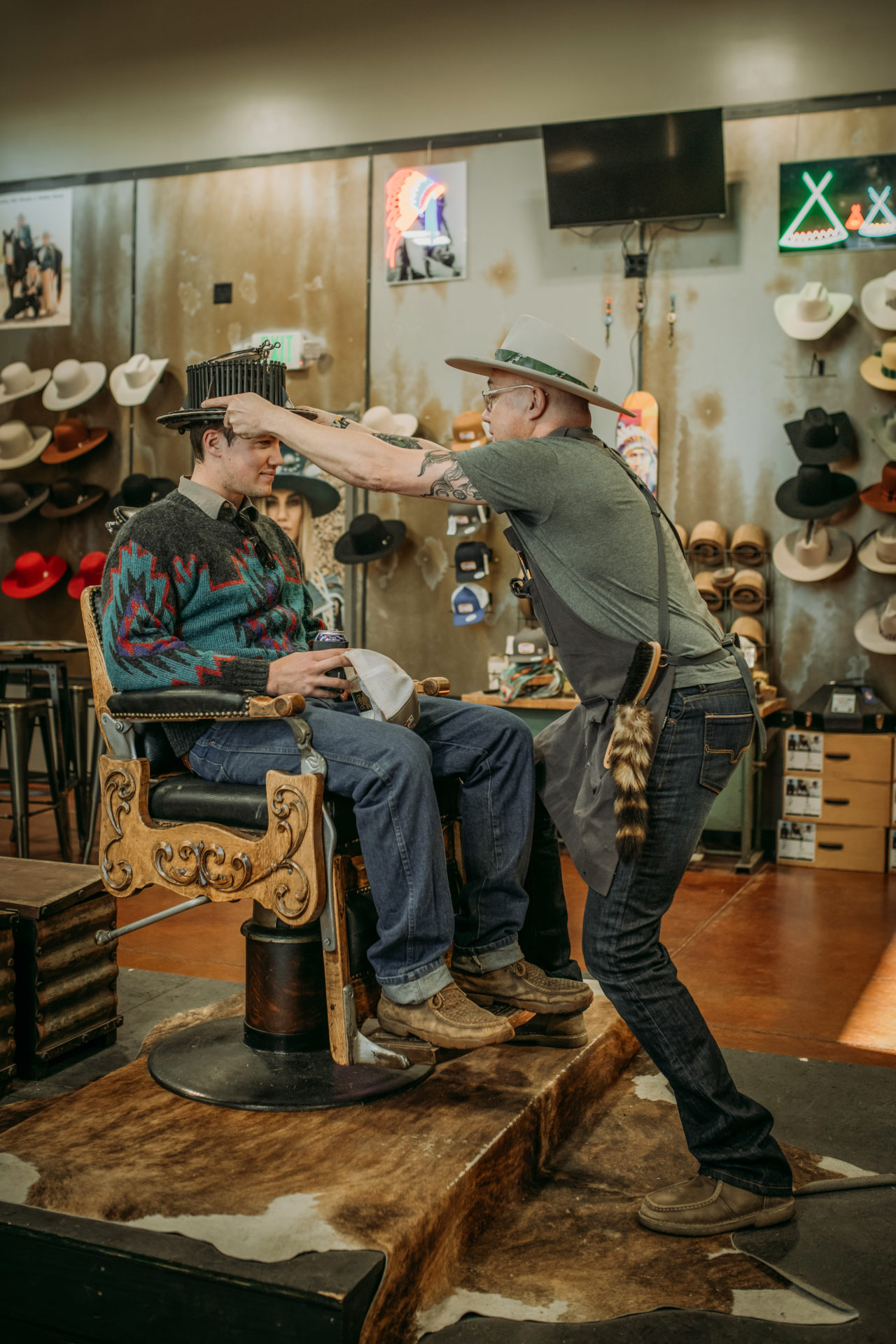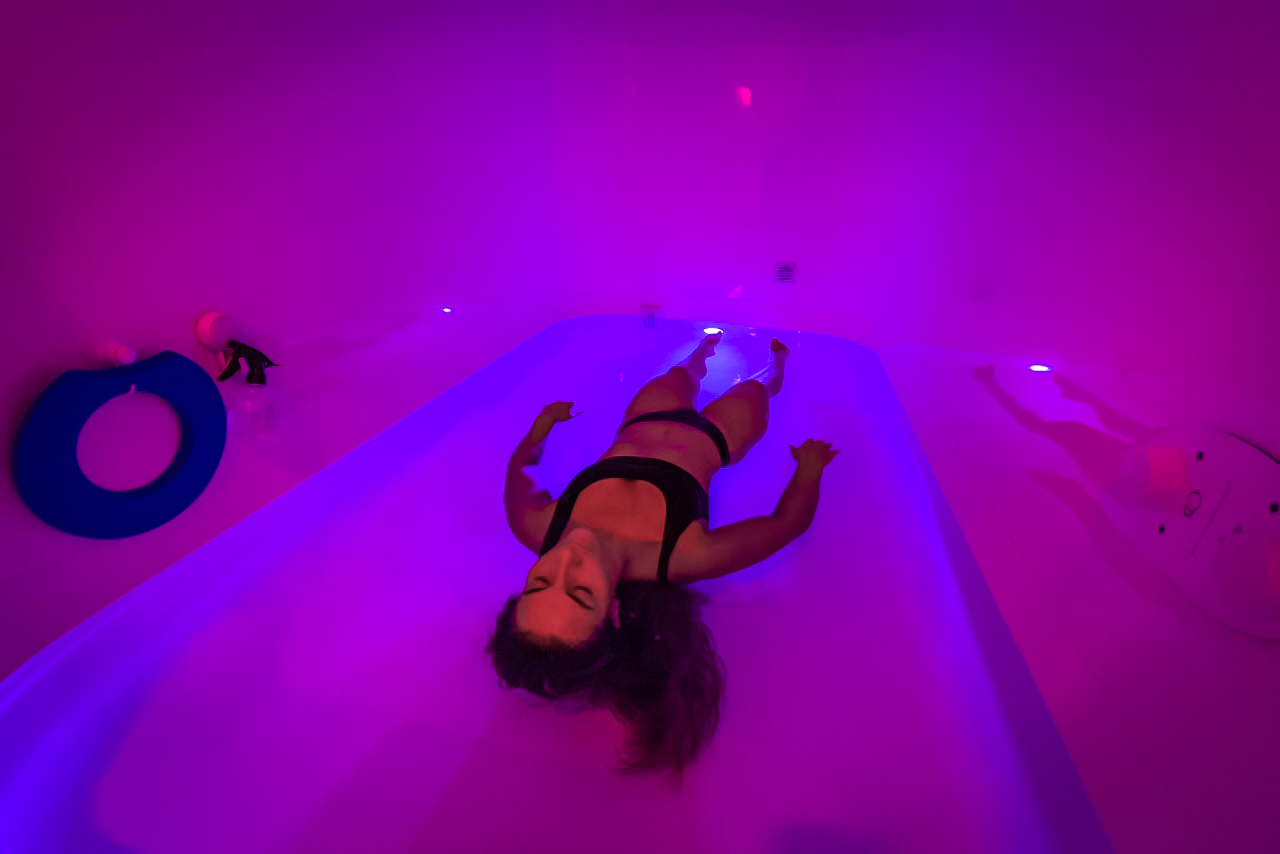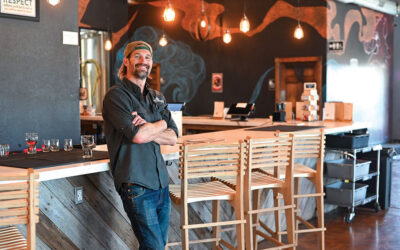
Even with his longtime desire to play in Colorado, it’s safe to say Ryan Bach was not expecting the first time he stepped onto the ice of the Budweiser Events Center to be a highlight of his career.
Bach was a goalie nearing the end of his career in 2003, the first year the Eagles became Northern Colorado’s first big pro team. Bach had only sniffed NHL ice, playing three games for the Los Angeles Kings in 1998, but he’d had a long minor-league career and All-American status playing for Colorado College (which was why he wanted to return home). The year before the Eagles, he’d just won a title with the Belfast Giants in Europe. Playing goalie for a start-up team in a mid-level minor league had to be more of a reminder that he was hanging on rather than on his way back.
And yet, Bach does remember stepping onto the ice, because the events center was sold out, and it sounded like it. He was blown away. Today, 20 years after the Eagles took the ice, he still is.
“I don’t think anyone knew the immediate impact we’d see from the fan base,” Bach says.
Lots of sports teams will say that about their fan base, of course, and try to turn their arena into the kind of hallowed grounds that few places actually live up to. Most, after all, aren’t Allen Field House in Kansas or Lambeau Field in Green Bay or Madison Square Garden in New York. But the Eagles’ place in Northern Colorado is special enough that it feels true, and it was that way from the moment Bach crouched in the goal.
“You know how special it is from the comments you get from any opposing team,” Bach says, “and the players tend to feed off that energy from the crowd.”
It obviously stuck with him: Bach became the team president a year ago after coaching for the Eagles and even acting as the color commentator next to Kevin McGlue for the team’s radio broadcasts. Bach, in fact, still feels that energy.
“The fan base, it’s very knowledgeable now,” Bach says. “They know what they are cheering for.”
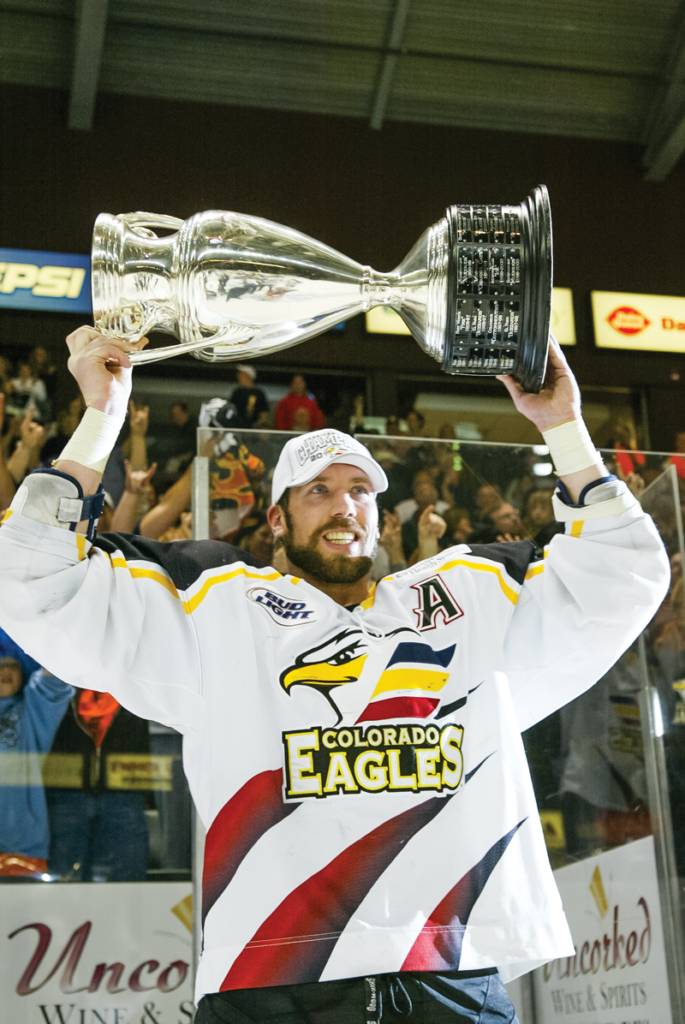
Ryan Tobler holds up the Ray Miron President’s Cup the Eagles won while playing in the Central Hockey League. Photo by Thomas Miller.
A favor for a friend
Martin Lind became a part owner of the Eagles as more of a favor to Ralph Backstrom than a love for hockey. He knew nothing about the game. Backstrom wanted to bring hockey to Northern Colorado, but all he had was his personality—he was universally described as a sweet man—and his status as a legend who played on six Stanley Cup-winning teams and coached for 15 years. Backstrom didn’t know anyone with the money to back his dreams. But Lind admired him, and he knew people with money. It seemed like a good time to get hockey to the area: The Avalanche had just won their second Stanley Cup.
Lind didn’t care about the risk as much: As the man responsible for Water Valley in Windsor and The Westlake Village Shopping Center in Greeley, he was used to much greater risks as a land developer. So, he didn’t expect to put much effort into it. He had a business to run.
“I never thought I’d get more involved than drinking a beer and watching fun hockey,” Lind says.
But Lind quickly realized he’d have to get more involved: He didn’t like the way the team was being run and fired the general manager after one year, even after the Eagles had a great first season, winning their division and advancing to the playoffs. Lind still didn’t know how to run a team and called this period “baptism by fire.”
“I knew, right away, that this was way too important to Northern Colorado for less than honorable actions in the general manager role,” Lind says. “I had to clean up some messes.”
His best move, he says, was installing Chris Stewart, the team’s head coach, as its general manager as well. Stewart led the Eagles to the Central Hockey League title in the team’s second year. He would eventually quit coaching in 2007, after he led the Eagles to their second CHL title, because of the strain of both jobs, but he would return in 2010. Stewart retired just three days before Backstrom’s death in February 2021.
Lind, like many others, was pleasantly surprised at the way the area embraced the team. In fact, he regrets not having more faith. The Budweiser Events Center, for example, has enough bathrooms for 60 percent of its hockey capacity. That seemed fine at the time, as that’s the average attendance for minor league hockey, even for big games, but there’s not enough bathrooms, Lind says, to handle the constant sell-outs of Eagles games.
“The lines are always too long,” he says.
Lind bought out his partners a couple years ago. The team hasn’t made him rich or, really, all that much money. There were several years it didn’t do well, even with all the sellouts, he says, and COVID-19 really hurt, as the team had all the expenses and no fans in the seats. Still, he doesn’t like taking too much credit.
“I don’t think of it as mine,” Lind says. “The 5,200 people in the seats are the owners.”
It’s still a little sad without Backstrom at the games, says McGlue, who acts as the team’s community relations director as well as its broadcaster. He would wear a suit and tie on game nights.
“The Eagles were a special source of pride for Ralph,” McGlue says. “Ralph was a constant presence at the arena. His love for this team was only matched by his passion to give back to the community, a core principle that still guides this organization today.”
That suit meant something, Bach says. It set a standard that was carried out by Stewart after the team’s difficult first year with management.
“There was only one way to run it,” Bach says, “and that was first class.”
Lind, in fact, now takes Backstrom’s cue and attends as many games as he can with his family, including his grandkids, in tow.
“The biggest thing, for me, is you don’t see an owner show up at every minor league hockey game with his family like he does,” Bach says of Lind. “It’s a family experience.”
It’s not a chore to attend games, Lind says. He does it to show he cares, of course, but after knowing nothing about hockey when he first became involved, he’s now a big fan.
“It’s a bit surreal,” he says. “I just smile. It’s a really cool thing to be a part of.”
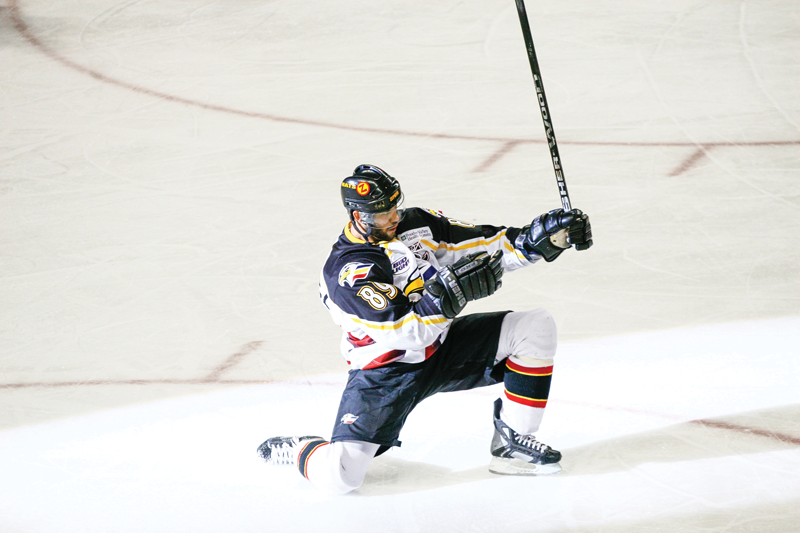
Greg Pankewicz played for the Eagles from 2003-2008. Photo by Brandon Iwamoto.
New leagues, same success
The Eagles changed leagues three times in 20 years, moves that could have derailed the team’s success. When the Rocky Mountain Rage of Broomfield moved in the CHL in 2006, Lind wasn’t happy about the competition and moved to the ECHL in 2011. The move turned out to be a good one, as the CHL folded in 2014 (the ECHL accepted the seven remaining teams into its league at the end of that year). But after dominating the CHL, there were questions about how well they would do.
“Fans had to get acclimated to it, but they saw it as a good level of hockey,” McGlue says. “It was a good time to make that move.”
Still, people love a winner, and the Eagles won back-to-back titles their last two years in the ECHL. In fact, when they went to the American Hockey League the next year, they didn’t return the ECHL trophy, breaking a longstanding tradition before relenting and sending it to the champion Newfoundland Growlers before the 2019-20 season.
The change to the AHL moved the Eagles far from its roots as a mid-level minor-league hockey team. The Eagles, as the Avs’ affiliate, now have the chance to showcase players that could be playing for the world champions. It still was an adjustment, but it wasn’t hard to sell the move to fans.
“It’s a different world from where we are now,” McGlue says. “You had many guys that were playing for the love of the game. It wasn’t to get rich. What we wanted to convey to the fans was what was so exciting about each move.”
The message for the AHL was much simpler but just as effective, Bach says.
“The development standpoint is really exciting,” he says. “The very next night the players they are watching now could be playing an hour south. That’s what makes it exciting.”
The Eagles also had a strategy for bonding with fans, McGlue says, that didn’t have much to do with what league they were in. They made it a point to get the players out in the community and hosted meet-and-greets before games, a trend pushed by Backstrom from the minute they took the ice for the first time.
“They’ve connected well,” McGlue says. “They’ve read books to school classes and gone to parades and met the fans. It’s really unique.”
That feeds off each other, as the fans will go to more games when they feel connected and then the players feel even more of a responsibility to get out.
“There’s a real sense when the players come out on the ice, they see the support there,” McGlue says. “They want to say thank you. What you see out there, every single night, is the same energy and support, whether that’s a Tuesday or a Saturday. You don’t see that very often across minor-league sports.”
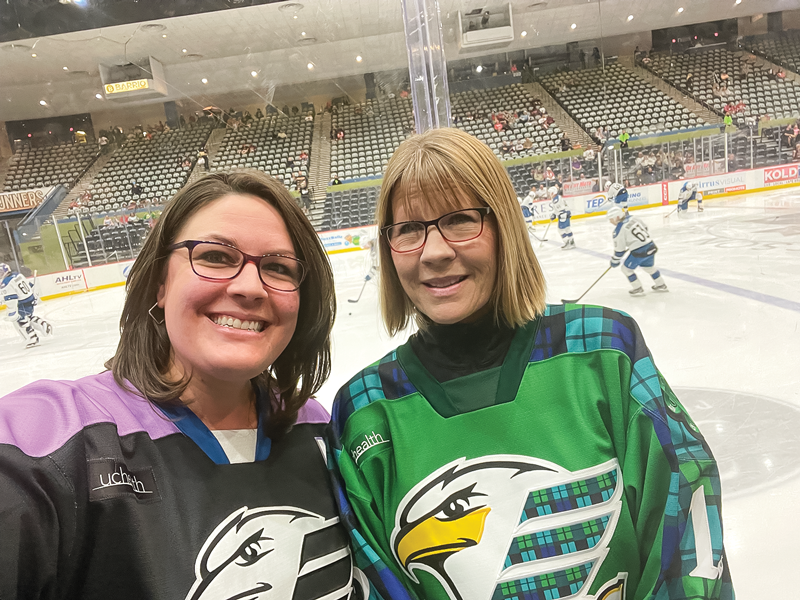
Jordan Gaspard with her mother, Paula Gaspard.
Love at first sight
Jordan Gaspard, 36, was probably destined to be an Eagles fan, even if she didn’t know much about hockey when she attended her first game.
She grew up in Texas and followed football as a result. She also played basketball, putting her obvious strength and size to good use, and golf in high school and, when she got older, played roller derby, a game similar to hockey, at least in the hitting, which Gaspard excelled at. When she got invited to a game during a work picnic at the Budweiser center, she immediately enjoyed the action.
“It was love at first sight,” says Gaspard, who lives in Loveland. “The atmosphere is amazing.”
But what surprised her was the way her mom, Paula Gaspard, got into the Eagles as well.
“She was never into sports,” Gaspard says. “But now she even looks up stats and stuff. It’s totally become our thing. Dad isn’t invited on our road trips.”
Jordan is a newer fan and has held season tickets since 2018, but she has nearly a dozen jerseys and brings them for guests to wear whenever she invites a friend out to a game. She’s only missed five games in the five years as a ticket holder. Her boyfriend has season tickets to the Avs, and she enjoys those games, but she loves the Eagles.
“I’ve learned more about the Avs as the Eagles players get on their team,” she says. “I feel like a proud mom when they do really well in the NHL.”
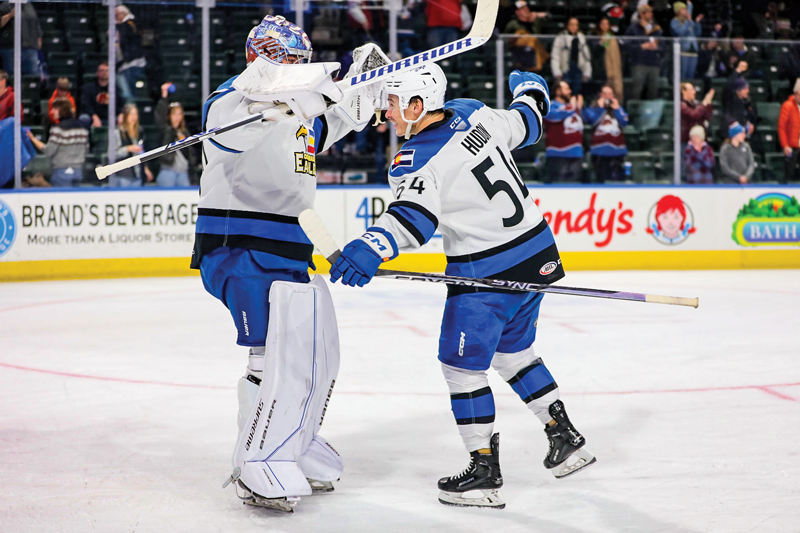
Goalie Justus Annunen and Forward Charles Hudon. Photo courtesy of Colorado Eagles.
Remember that Lind was not a hockey fan either when he first saw the Eagles, but he’s since learned so much from them and the way they draw families in along with season-ticket holders, he wants to change his company.
“No one north of Denver does family entertainment,” Lind says. “We want to change into a family and corporate entertainment company.”
He’s working with the county on a new hockey arena and facility that would host youth hockey as well as give the Eagles a venue that could host 8,000 for hockey and 10,000 for events and encourage retail and development to surround the place. McNichols sports arena in Denver was 25 years old when they tore it down, Lind says. The Budweiser Events Center turns 20 along with the Eagles this year. He hopes Larimer County would still find good uses for it.
Lind has other ideas as well, including a sledding hill in Windsor and a water park and hotel. The Eagles, in other words, have had a huge impact on his life as well as the lives of nearly everyone in Northern Colorado.
“The Eagles have taught us,” Lind says, “that it’s really fun to be in a fun business.”
____________________________________________________________
Dan England is a mountain climber, ultrarunner, freelance writer and coach who lives in Greeley with his three kids, a son and twin girls, his singing wife Valerie, and his herding dog Pepper.


